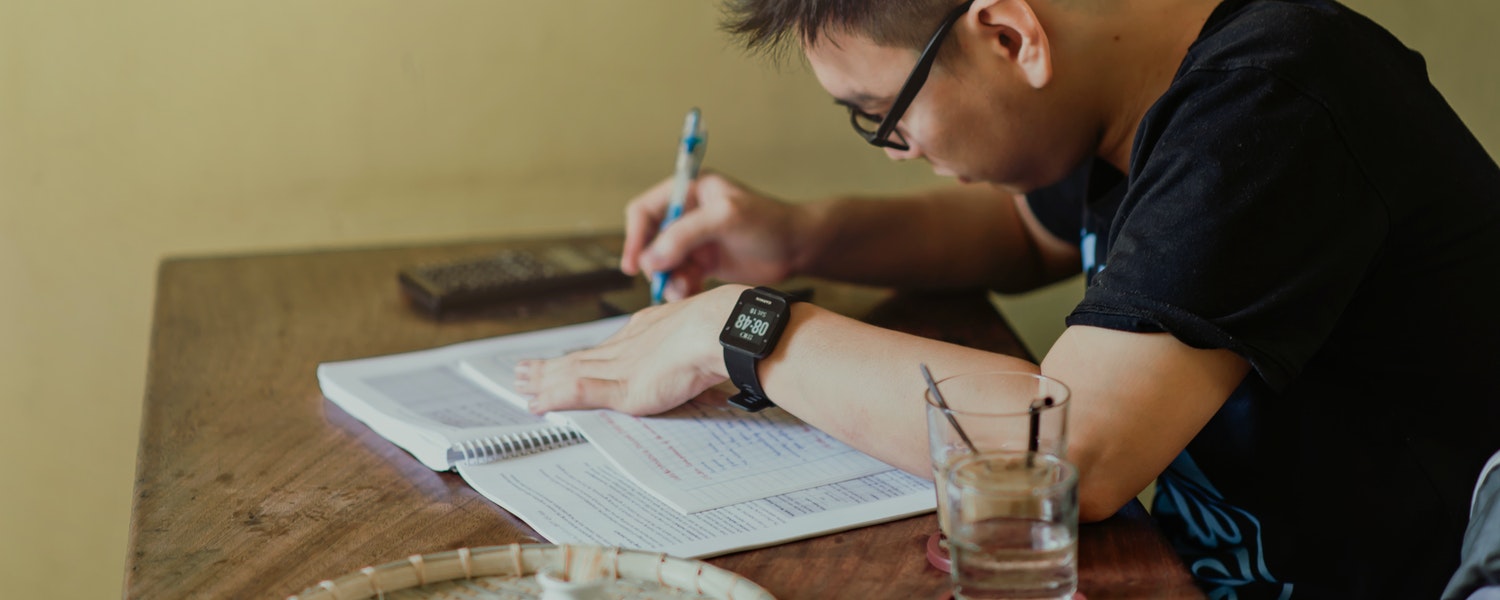Finish Strong

In our blog post “Test Anxiety No More,” Juliana talked about how to reduce stress and test anxiety with some key principles to apply in order to have a mindset that is relaxed and ready to go. Her post is encouraging and empowering as you finish strong this semester! In addition to her guidelines, here are 3 key practical steps to help you face your finals.
1. Find out all that you can about the exam!
Ask questions in class, or email your professor with your questions. Make sure you know all that you can about this exam.
Is the test open-book? Are the questions multiple choice? Are there essay questions? Will it be timed? How many questions or parts are on the test? What concepts will be on the test? Is the test cumulative? Which testing centers can we use for this test?
Seriously, when in doubt, don’t ever be afraid to ask questions. Also, make sure you take the time right now to review any available information that is provided about the exam. The sooner you take action, the sooner you will gain a better understanding of how you should study and prepare for the exam. Finally, make sure you double-check (no….triple check) when the testing centers are open. Give yourself plenty of time to get there, wait in line (which could be longer depending on when you go), and take the exam without feeling rushed. Before you begin your test, be very careful to double-check that it is the correct exam, and thoroughly review the instructions.
2. Know Your Resources:
Study Guides
STUDY GUIDES ARE AMAZING! Even if you don’t remember your professor mentioning it, your class may have a study guide hidden somewhere on a Canvas course page. Take time to find it and use it. Fill in all the practice questions. If your study guide feels a little bland, you can organize it by color-coding the concepts that are in the same module/chapter/topic. Don’t be afraid to write down notes in your study guide!
If there’s not a study guide, create your own. While that may sound tedious, making your own study guide can be easy if you have an idea of what to look for and what concepts to focus on. In creating your study guide, here are some resources you can use to help you know what to study.
-
Your Textbook (This could include certain definitions or concepts that are written in bold.)
-
Textbook Chapter Reviews and Summaries (This could include practice test questions.)
-
Lecture Notes (Look for patterns in your notes of what your professor likes to repeat. You will especially want to pay attention to concepts you wrote down where your professor has said “This will be on the test!”)
-
Syllabus (This can provide a great outline for what you need to study, especially for cumulative tests.)
-
Previous test questions (Look at and write down questions and answers you have gotten wrong in the past.)
Flashcards
I love using flashcards because you can easily incorporate variety in how you use your different senses to help you retain information. This is where Active Learning can come into play, which is when you use learning activities that help you stay engaged.
Instead of just passively looking at the material, read it aloud. Draw diagrams and charts using different colors. Write parts of a concept down (even as little as a word or a phrase) and quiz yourself on defining or explaining the term. Have other people quiz you with flashcards. Try to teach the concept to them. Turn your sessions when you are quizzing yourself into a game.
These techniques can help you connect concepts and solidify their relationships to each other in your brain. On a side note, there are also multiple online study resources that serve as online flashcards. Quizlet is one that I have used and enjoyed.
Another big plus regarding flashcards is that they’re portable, making it easy to recite and review again and again. You can also move around as you prepare for the test. Do some basic exercises in between reviewing a certain number of cards. Walk around your room or even outdoors as you review your flashcards. (JUST DON’T DRIVE WHILE YOU’RE REVIEWING THEM.) You may find that simply moving to a different study location every now and then is a great way to keep your brain awake and active.
3. Study a Little Bit Every Day
Final exams can be intimidating, so why should we make studying for them intimidating? Even as the finals approach, you don’t have to make your study sessions huge projects. Instead, study for a little bit every day. Whether you’re on the bus, in the middle of waiting for someone, or on campus with a little extra time because class ended early, take advantage of the little snippets of time that you can make available.
In addition to studying a little here and a little there, make sure you schedule some time each day when you can review and recite the material to yourself. Use your calendar to help you find and schedule a certain time of day when you can most easily commit to studying for each exam. A great way to help you stay focused is by using the Pomodoro Method where you set a timer for how long you will study, incorporating short breaks in between study sessions.
A Note on Final Papers
For all of you who have final papers instead of exams, this third point of doing a little bit every day is especially key! If you have final papers that you still need to work on, I would suggest taking a little time (probably about the same time as it took you to read this blog) and breaking down your final papers into smaller steps right now. An example of breaking down a paper into smaller steps would be to plan when to have a brainstorming session, create an outline, look up sources, develop a rough draft, and so on. Set miniature deadlines of when you want to complete each step, leading to your entire paper being submitted in a timely manner.
Even though finals are coming up fast, don’t be discouraged or wait to get started on studying for your final exams or writing your final papers. You are so close! I know the temptation might be to simply rush to “get it done.” Instead, take a deep breath. Be proactive and purposeful during these last few weeks. Focus on what you can do right now, take those 3 steps we talked about into consideration, and finish strong. You can do it!
About The Author

‌ Back to Blog
